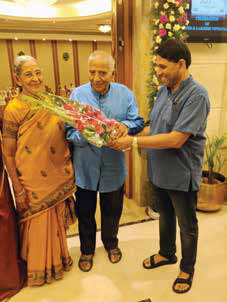In many of our cities today, we find young folks struggling in small houses with children in day-care and crèches and the family elders rarely given the opportunity to advise or participate in family matters except the weekly phone call

It took a moment of epiphany on a sultry evening in the quaint town of Pondicherry for me to realise that the nuclear families of today are losing one of the most important assets of our generation—the wisdom of the elders!
The occasion was historic in the journey of our family. My wife Uma’s parents, S.V. Iyer and Lakshmi Viswanathan were celebrating their sixtieth wedding anniversary and the family had gathered from all over the country and the world to felicitate them. Their story is typical of most middle-class families in our country. Mr Iyer’s mother Parvathy was a young widow who brought up three sons and a daughter through hard work and lived to a ripe age of over a hundred years. Mr Iyer and his wife started working for All India Radio in Nagpur, moved to Pondicherry in the sixties and raised and educated five children who are doing well in their chosen professions in California, Oregon, Tamil Nadu and Maharashtra. What they imparted to their children and continue to do—to inspire the large extended family including one great-grandchild—today is their commitment to social service and keeping the good of the community above their own self-interest.
Every reader of this column will be able to share an anecdote about a moment of realisation and subsequent life correction triggered by a conversation with a family elder. In the city of Pune, there are still many of our colleagues who have parents at home or in their vicinity who take great pleasure in participating in family activity. When you meet a woman in her thirties or forties using a phrase that seems out of tune with her normal vocabulary, you know that a recent interaction with a close elder has occurred. In the field of knowledge management, we are often taught that data, when classified becomes information and many doses of experience and context are required to transform information to knowledge and then embed it as wisdom. Strange how much wisdom we choose to ignore in our mad world of data today and how much of it is available in close proximity if only we choose to tap into it!
Strange how much wisdom we choose to ignore in our mad world of data today and how much of it is available in close proximity if only we choose to tap into it!
 Celebrating the 60th wedding anniversary
Celebrating the 60th wedding anniversaryIn many of our cities today, we find young folks struggling in small houses with children in daycare and crèches and the family elders rarely given the opportunity to advise or participate in family matters except the weekly phone call. A lot of my Harvard classmates in the USA visit their parents just once a year on Thanksgiving Day and it may not be long before we see this happening at Diwali or Christmas or Eid time in our country. Can the country truly develop if the wisdom of so many decades is locked up in senior citizen homes and denied a chance to truly contribute?
Our family has been a little more fortunate in this respect and this could well be true of many families where children have done well in their careers and retain the respect and gratitude to their elders that they will invest in travel and spending time with the families rather than keeping elders tucked away in a hometown or village. The extensive use of WhatsApp today and the alacrity with which elders have embraced it is also leading to more collaborative and chatty family groups, sometimes over the top, of course. But it’s always good to see elders taking every opportunity to add to a conversation or offer their words of advice. My daughter’s successful academic and professional career owes a lot to my mother who lived with us in Mumbai during her formative years and even today elders are playing a role in the emotional and intellectual development of the children in the family— long may that last!
A few action items from someone who has seen the best of wisdom and knowledge flowing across age barriers so many times and also seen examples of youth who have never felt the steadying influence of an elder calming them in moment of stress and soothing their worries at times of stress. Let us celebrate the people we have, cherish the memories of those who are no more with us and ensure that our hectic life leaves space for rich interactions with those who care deeply for our success and more importantly, our happiness!
Back to Pondicherry and it was amazing to see that while seventy people had been invited to the celebration, seventy-two actually came, from teenagers to octogenarians like my in-laws. The speeches flowed, including some songs and the underlying theme was the commitment—to senior citizens, to the city and to various causes that the Iyer family holds very dear to their hearts. As my mother-in-law Lakshmi said in her closing speech, what each one of has to learn is to stop feeling envious of those richer or higher than us and look instead at those who are below us in position, wealth or education and do whatever we can to enhance their livelihood and confidence. Truly worth emulating for all of us who endeavor to build a more inclusive India.
Dr Ganesh Natarajan is Chairman of 5F World, Pune City Connect and Social Venture Partners, India.
Ganesh Natarajan